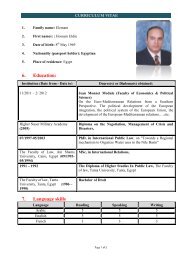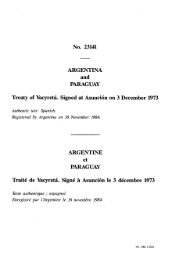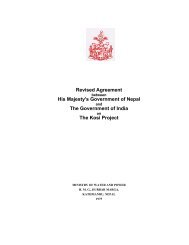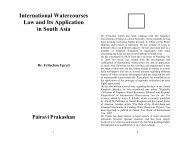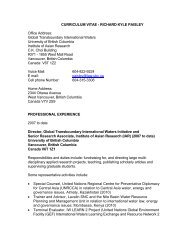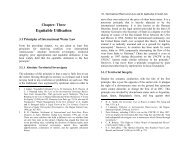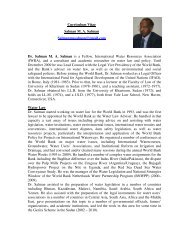242 / <strong>International</strong> <strong>Watercourses</strong> <strong>Law</strong> <strong>and</strong> <strong>Its</strong> <strong>Application</strong> in South Asia Prospects <strong>and</strong> Problems of Nepalese Water Resources / 243so that at least friendship <strong>and</strong> influence survive.Ultimately, these will remain our best weapons inthe Himalayan kingdom. We cannot afford toblunt them through the antics of busybodieswhose phoney idealism or cynical calculationthreatens to spoil the climate for areconciliation." 184Hence, as a regional power, India should not continue to expectreciprocity in every agreement (as, for example, in theprovision of the Peace <strong>and</strong> Friendship Treaty 1950), which herweak neighbour cannot sustain. If this arrangement were madeapplicable in Nepal, <strong>and</strong> if 3% of Indians were allowed to doso, then the population with Indian origin in Nepal would bethe majority. But if the same percentage of Nepalese were toassimilate into India's one billion population, it would not makeany difference to them, because 600,000 people (3% of 20million) would not make a noticeable impact on one billion.Since the right of access to <strong>and</strong> from the sea is already settledas a customary rule of international law, this right should beprovided unhindered <strong>and</strong> without dem<strong>and</strong>s for concessionsfrom Nepal. A huge country with large resources such as Indiashould not ask for complete reciprocity from a weak <strong>and</strong>vulnerable neighbour such as Nepal, but rather, shouldcooperate wholeheartedly. In other words, while India itself adeveloping country it should nonetheless cooperate with itseven less-developed neighbour.India, since she is a regional power <strong>and</strong> has a strategic position(in particular because every drop of water from Tibet, whetherit passes through Bhutan <strong>and</strong> India or through Nepal <strong>and</strong> India,drains into the ocean via Bangladesh), has a greaterresponsibility to create an environment for broader regional cooperation,as a result of which the whole region would be184 S.K. Datta-Ray, "Living with Nepal: Must Busybodies Queer thePitch?" in the Statesman weekly, 17 India, February (1990), p. 11.converted into a developed <strong>and</strong> prosperous part of the world.Simultaneously, the other nations also need to move forward,resolving each <strong>and</strong> every issue in the changing context, in orderto meet the wider objectives of such co-operation. If thesearrangements could be made, the resources, technology <strong>and</strong>skill of the world would undoubtedly become available to thesegovernments. 185The facts suggest that in terms of water per unit of l<strong>and</strong>, theGanges-Brahmaputra-Meghana basin is second only to theAmazon. Unique stores of flora <strong>and</strong> fauna, <strong>and</strong> endangeredspecies are found in the only Sundarbans (the largest mangroveforest in the world). The attainment of India’s aspiration tobecome a member of the Security Council of the UN alsohinges on how much she can reconcile every state’s interest in abalanced way. Third party involvement was recommended inIWC finance, technology <strong>and</strong> manpower transfer to developingcountries, as in the case of the Indus Waters Treaty 1960. 186India must accept this reality now <strong>and</strong> forget the intransigentpattern of bilateralism.4.14 Conditions for Funding Imposed by theWorld Bank <strong>and</strong> the Other DonorsThe implementation of water projects is a costly business,involving huge amounts of money with a long gestation period.The WB has been financing transboundary water projects since1949 (El Salvador’s RioLempa Hydroelectric Project), thenagain in Rhodesia in 1956, where there was no riparian dispute.On the other h<strong>and</strong>, the Bank refused to finance the BhakraNangal Project in India in 1949, the Lower Sind Barrage in185 Supra note 34, p. 130.186 A. K. Biswas, “Indus Water Treaty: The Negotiation Process” (1992)in 17 WI, p. 209.
244 / <strong>International</strong> <strong>Watercourses</strong> <strong>Law</strong> <strong>and</strong> <strong>Its</strong> <strong>Application</strong> in South Asia Prospects <strong>and</strong> Problems of Nepalese Water Resources / 245Pakistan in 1950, the Aswan Dam in Egypt in 1955, theRoseries Project in Sudan in 1987, or the Three Gorges projectin China. All of these refusals were linked with adverse effects<strong>and</strong> riparian objections. 187 From its experience the Bank firstdrafted its operational policy memor<strong>and</strong>um in 1956 for its ownstaff to use; it was revised in 1964 <strong>and</strong> 1985. In 1993 the Bankadopted an Operational Manual <strong>and</strong> Operational PoliciesO.P.750, “Project on <strong>International</strong> Waterways” <strong>and</strong> bankprocedure “Project on <strong>International</strong> Waterways”. Thesedocuments were revised in July, 2001. All of these documentsare based on the principles of ‘no harm’ rules <strong>and</strong> the reasongiven was that for this, the principles of ‘equitable utilisation’contain abstract ideas, vagueness <strong>and</strong> a lack of clarity. 188 In asimilar vein, a document posted on the internet by the Bankseeks to justify its current policy. 189 These rules are against thecore principle of IWL, equitable utilisation, <strong>and</strong> it should beamended to reconcile to this principle, because internationalinstitutions can no longer operate against the rules of IWL. 190 Itis illegimate not only from the legal point of view but also fromthe political point of view.187 R. Krishna, “The Evolution <strong>and</strong> Context of the Bank Policy forProjects on <strong>International</strong> Waterways” in <strong>International</strong> <strong>Watercourses</strong>:Enhancing Co-operation <strong>and</strong> Managing Conflicts, Washington DC:World Bank Technical paper 414, Salman et. el (eds), 1998 p 31; alsosee A. Nollkaemper, “The Contribution of the <strong>International</strong> <strong>Law</strong>Commission to <strong>International</strong> Water <strong>Law</strong>; Does it Reverse the Flightfrom Substance?” (1996) in XXVII NYBIL, p. 57.188 Ibid. Also see “D. Goldberg, “World Bank Policy on <strong>International</strong>Waterways in the Context of Emerging <strong>International</strong> <strong>Law</strong> <strong>and</strong> theWork of the <strong>International</strong> <strong>Law</strong> Commission” in The PeacefulManagement of Transboundary Resources, Dordrecht: Graham &Trotman/ Martinus Nijhoff, 1995, pp. 153-165.189 World Bank Group, <strong>International</strong> Waterways,www4.worldbank.org/legal/legen/legen_iw.html190 S. P. Subedi, “Resolution of <strong>International</strong> Water Disputes: Challengesfor the 21st Century” in PCIA (ed), Resolution of <strong>International</strong> WaterDisputes, the Hague: Kluwer <strong>Law</strong>, 2003, pp. 33-47.Before 1980 little attention was given to the environment <strong>and</strong>sustainable development; as a result of this, the WB <strong>and</strong> othermultilateral funding agencies had received pointed criticism. 191Consequently the WB has changed its policy to takeenvironmental issues into consideration, <strong>and</strong> several new ruleshave been enacted. These measures have been adopted byregional development banks, UN agencies <strong>and</strong> bilateral donor,particularly the G7 countries. 192 Furthermore, in order topreserve <strong>and</strong> protect several aspects of the environment,numerous funds have been created since 1990, such as theWorld Heritage Fund, Wetl<strong>and</strong>s Funds, the Montreal ProtocolMultilateral Fund, the Global Environment Facility. 193 Theseinstruments set out conditions to be complied with in order toqualify for a loan or assistance. Consistent with theseinstitutional regulations, a state which is looking for a loan fordeveloping a water project requires riparian consent in order toproceed; in the case of IWC, riparian states are required toexchange information in regards to the particular project.Unless <strong>and</strong> until this has occurred, the Bank would not besatisfied that other riparian countries had given consent for theexecution of the project, <strong>and</strong> that the project does not cause any191 P. S<strong>and</strong>s, The Principle of <strong>International</strong> Environmental <strong>Law</strong>, NewYork: Manchester University, 1995, p. 731. The construction of thePolonoreste dam in Brazil resulted in significant environmentaldamage at both national <strong>and</strong> regional levels. Also see I. F. I. Shihata,The World Bank in a Changing World: Selected Essays, Dordrecht:Martinus Nijhoff Pub., 1991, pp.135-180192 For the Kuwait Fund for Arab Economic Development seewww.kuwait-fund.org/frames.htm <strong>and</strong> for the Saudi fund see thespeech delivered by M. AL-Shawi, Director of the fund atwww1.worldbank.org/harmonization/romehlf.IPlans/SaudiFund.statement.pdf.193 Supra note 192, pp. 730-736.



